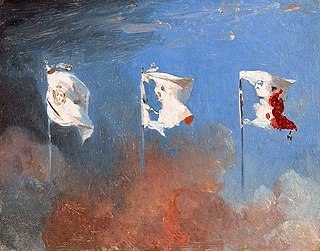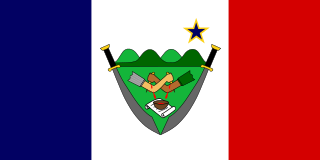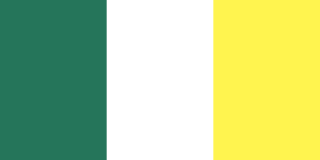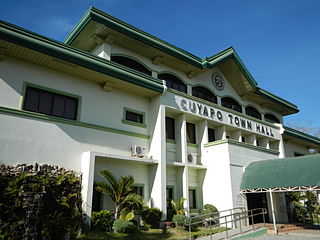| Region | Province | Flag Image | Flag Description | Date of Adoption
(Legal Basis) |
|---|
| CAR | Abra | | Plain green field with the provincial seal in the center. Flag proportion is approximately 2:3. [8] | |
Region 13
(Caraga) | Agusan del Norte | | Plain golden yellow field with the provincial seal in the center. Flag proportion is approximately 2:3. [9]
Governor's flag: Plain golden yellow field, centered within which are the provincial seal and a line of text in black serif typeface ("AGUSAN DEL NORTE") below the seal; this flag's proportion is approximately 1:2. [9] | |
Region 13
(Caraga) | Agusan del Sur | | Plain yellow field with the provincial seal in the center. Flag proportion of the most common outdoor flag variant is 2:3. [10] | |
Region 6
(Western Visayas) | Aklan | | Governor's (gold) version: Plain golden yellow field, centered within which are the provincial seal and a line of text in black sans serif typeface ("PROVINCE OF AKLAN") set in a wide arc above the seal. Flag proportion is approximately 2:3. [11]
Sangguniang Panlalawigan chamber (white) version: Plain white field with the provincial seal in the center; flag proportion is approximately 2:3. [12] | |
Region 5
(Bicol) | Albay | 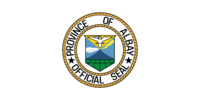
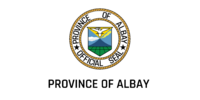 | Plain white field with the provincial seal in the center. Flag proportion of the most authoritative variant is 1:2. [13]
Governor's flag: Plain white field, centered within which are the provincial seal and a line of text in red sans serif typeface ("PROVINCE OF ALBAY") below the seal; this flag's proportion is approximately 1:2. [13] | |
Region 6
(Western Visayas) | Antique | | Plain deep green field with the provincial seal in the center. Flag proportion of the most authoritative variant is approximately 3:5. [14] | |
| CAR | Apayao | | Plain golden yellow field, centered within which are the provincial seal and a line of text in green serif typeface ("PROVINCE OF APAYAO") below the seal. Flag proportion is approximately 2:3. [15] | |
Region 3
(Central Luzon) | Aurora | | Plain green field with the provincial seal in the center. Flag proportion is approximately 1:2. [16] | ca. 2015 [16] [17] |
| ARMM | Basilan | 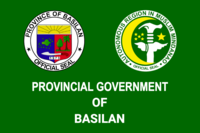 | Plain green field green field with the provincial seal set on the upper hoist and the Seal of the Autonomous Region in Muslim Mindanao on the upper fly. Words in white color and rendered in various sans serif (Arial) typefaces appear in the lower half of the flag; the text is split into three lines: PROVINCIAL GOVERNMENT // OF // BASILAN. Flag proportion is approximately 2:3. [18] | ca. 2014 [18] [19] |
Region 3
(Central Luzon) | Bataan | 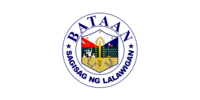 | Plain white field with the provincial seal in the center. Flag proportion is approximately 1:2. [20] | |
Region 2
(Cagayan Valley) | Batanes |  | Plain maroon field with the provincial seal in the center. Flag proportion of the most authoritative variant is approximately 1:2. [21] | ca. 1995 (current seal) [22] |
Region 4-A
(Calabarzon) | Batangas |  | Horizontal tricolor of royal blue (top), white (middle) and red (bottom) stripes, with the provincial seal in the center of the white stripe. Official flag proportion is 1:2. [23] | December 2009 [24] |
| CAR | Benguet |  | Plain white field with the provincial seal in the center. Most common flag proportion is 1:2. [25] | |
Region 8
(Eastern Visayas) | Biliran | 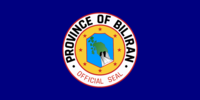 | Plain navy blue with the provincial seal in the center. Flag proportion is approximately 1:2. [26] | |
Region 7
(Central Visayas) | Bohol |  | Vertical tricolor of navy blue (hoist), white (middle) and red (fly) panels, with a central charge — consisting of a tableau of the Sandugo enclosed by the Chocolate Hills and two swords, plus a blue five-pointed star fimbriated yellow (always on the observer's right, even in the reverse side) — all contained in the white panel. Official flag proportion is 1:2. [27] [28] | 1971 [29]
(Provincial Board Res. No. 121) |
Region 10
(Northern Mindanao) | Bukidnon | 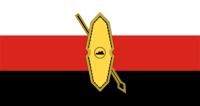 | Horizontal tricolor of white (top), red (middle) and black (bottom), charged in the center with a golden emblem consisting of a spear pointing downward toward the fly, and a shield bearing the stylized profile of the Kitanglad mountain range. [30] Official flag dimensions are 34 inches in width and 64 inches in length, or a flag proportion of 17:32. [31] | |
Region 3
(Central Luzon) | Bulacan | 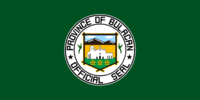 | Plain green field with the provincial seal in the center. Most common flag proportion is 1:2. [32] | |
Region 2
(Cagayan Valley) | Cagayan |  | Horizontal tricolor of navy blue (top), golden yellow (middle) and green (bottom), charged with the provincial shield ringed by 29 white, five-pointed stars, all placed toward the hoist. [33] Official flag proportion is 1:2. [34] | 11 March 1970 [34]
(Provincial Board Res. No. 319) |
Region 5
(Bicol) | Camarines Norte | 
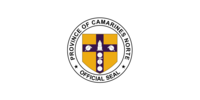 | Government flag: Plain white field with the provincial seal in the center; government flag's proportion is approximately 1:2. [6]
Civic flag (image on the left): Vertical tricolor of green (hoist), white (middle) and yellow (fly); civic flag's proportion is approximately 1:2. [6] | |
Region 5
(Bicol) | Camarines Sur | 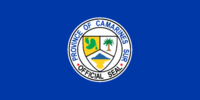 | Plain royal blue field with the provincial seal in the center. Flag proportion is approximately 1:2. [35] | |
Region 10
(Northern Mindanao) | Camiguin |  | Plain green field with a modified version of the provincial seal in the center. Flag proportion is approximately 1:2. [36] | |
Region 6
(Western Visayas) | Capiz |  | Plain light blue field with the provincial seal in the center. Most common flag proportion is approximately 1:2. [37] | |
Region 6
(Western Visayas) | Catanduanes |  | Plain green field with the provincial seal in the center. Most common flag proportion is 1:2. [38] | |
Region 4-A
(Calabarzon) | Cavite | 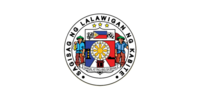 | Plain white field with the provincial seal in the center. Most common flag proportion is 1:2. [39] | |
Region 7
(Central Visayas) | Cebu | 
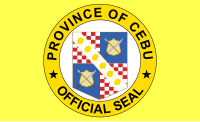 | Plain yellow field with the provincial seal in the center. Flag proportion of the most authoritative indoor variant is approximately 1:2 while the outdoor variant is approximately 3:5. [40] | |
Region 11
(Davao Region) | Compostela Valley |  | Plain white field with the provincial seal in the center. Flag proportion is approximately 3:5. [41] | |
Region 12
(Soccsksargen) | Cotabato | 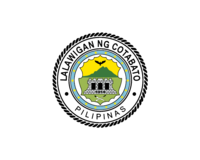 | Plain white field with the provincial seal in the center. Most common flag proportion is 4:5. [42] | |
Region 11
(Davao Region) | Davao del Norte | 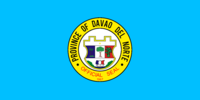 | Plain light blue field with the provincial seal in the center. Most common flag proportion is 1:2. [43] | |
Region 11
(Davao Region) | Davao del Sur | 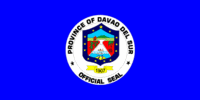 | Plain royal blue field with the provincial seal in the center. Most common flag proportion is 1:2. [44] | |
Region 11
(Davao Region) | Davao Occidental | | Plain white field with the provincial seal in the center. Flag proportion is approximately 5:9. [45] | |
Region 11
(Davao Region) | Davao Oriental |  | Plain navy blue field with the provincial seal in the center. Flag proportion of the most authoritative variant is 1:2. [46] | |
Region 13
(Caraga) | Dinagat Islands | 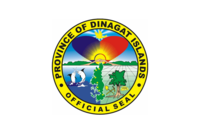 | Plain white field with the provincial seal in the center. Flag proportion of the most authoritative variant is approximately 2:3. [47] | |
Region 8
(Eastern Visayas) | Eastern Samar |  | Vertical tricolor of navy blue (hoist), white (middle) and red (fly) panels, with the provincial seal centered within the white panel. Flag proportion is approximately 1:2. [48] | |
Region 6
(Western Visayas) | Guimaras | 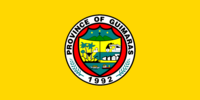 | Plain golden yellow field with the provincial seal in the center. Flag proportion is approximately 1:2. [49] | |
| CAR | Ifugao | | Plain royal blue field with the provincial seal in the center. Flag proportion is approximately 11:18. [50] | |
Region 1
(Ilocos Region) | Ilocos Norte |  | Plain white field with the provincial seal in the center. Most common flag proportion is 1:2. [2] | 13 June 2011 (current seal) [51]
(SP Ordinance No. 30) |
Region 1
(Ilocos Region) | Ilocos Sur | 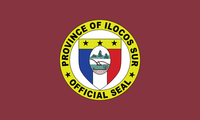 | Plain burgundy field with the provincial seal in the center. Flag proportion is approximately 3:5. [52] | |
Region 6
(Western Visayas) | Iloilo |  | White field with a circular version of the provincial shield placed in the right half of the flag, and three lines of text in centered justification in the left half. The first two lines ("PROVINCE" and "OF") are in golden yellow color, while the third line ("ILOILO") is written in blue and in larger size. Flag proportion is approximately 1:2. [53] | |
Region 2
(Cagayan Valley) | Isabela | 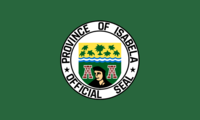 | Plain green field with the provincial seal in the center. Flag proportion of the most authoritative variant is approximately 6:11. [54] | |
| CAR | Kalinga |  | Plain white field with the provincial seal in the center. Flag proportion of the most recent variant is 2:3. [55] | |
Region 1
(Ilocos Region) | La Union |  | Plain white field with the provincial seal in the center. Most common flag proportion is 1:2. [56] | |
Region 4-A
(Calabarzon) | Laguna | 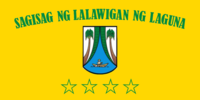 | Yellow field with the provincial shield in the center. Set in a wide arc above the shield are the words "SAGISAG NG LALAWIGAN NG LAGUNA" written in dark green. Below the shield are four five-pointed stars, thinly fimbriated dark green and arranged in a straight line. Most common flag proportion is 1:2. [4] | ca. June 2014 (restored) [4] |
Region 10
(Northern Mindanao) | Lanao del Norte | 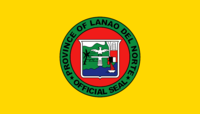 | Plain golden yellow field with the provincial seal in the center. Flag proportion is approximately 4:7. [57] | |
| ARMM | Lanao del Sur | 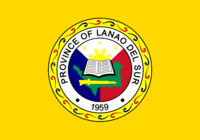 | Plain golden yellow field with the provincial seal in the center. Flag proportion is approximately 7:10. [58] | |
Region 8
(Eastern Visayas) | Leyte | 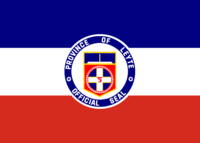 | Horizontal tricolor of navy blue (top), white (middle) and red (bottom), with the provincial seal (fimbriated white) in the center of the flag. Flag proportion of the most authoritative variant is approximately 5:7. [59] | |
| ARMM | Maguindanao |  | Plain green field with the provincial seal in the center. Most common flag proportion is 2:3. [60] | |
Region 4-B
(Mimaropa) | Marinduque | 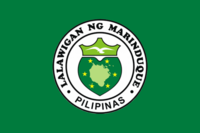 | Plain green field with the provincial seal in the center. Flag proportion of most recent variant is approximately 2:3. [3] | |
Region 6
(Western Visayas) | Masbate | 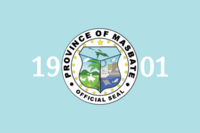 | Plain very light blue field with the provincial seal in the center, flanked by to the left and right by the numbers “19” and “01,” both rendered in white, respectively. Flag proportion is approximately 2:3. [61] | ca. 2014 [61] |
Region 10
(Northern Mindanao) | Misamis Occidental | | Plain golden yellow field with the provincial seal in the center. Flag proportion is approximately 1:2. [62] | |
Region 10
(Northern Mindanao) | Misamis Oriental | 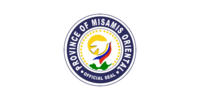 | Plain white field with the provincial seal in the center. Flag proportion is approximately 1:2. [63] | |
| CAR | Mountain Province |  | Plain golden yellow field with the provincial seal in the center. Flag proportion of most authoritative variant is approximately 9:16. [64] | |
Region 6
(Western Visayas) | Negros Occidental |  | Plain light blue field with the provincial seal in the center. Flag proportion of most authoritative variant is approximately 2:3. [65] | |
Region 7
(Central Visayas) | Negros Oriental | 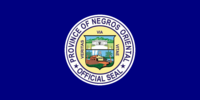 | Plain navy blue field with the provincial seal in the center. Flag proportion of most authoritative variant is approximately 1:2. [5] | |
Region 8
(Eastern Visayas) | Northern Samar | 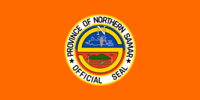 | Plain orange field with the provincial seal in the center. Flag proportion of most authoritative variant is approximately 1:2. [66] | |
Region 3
(Central Luzon) | Nueva Ecija | 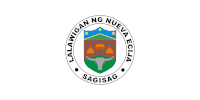 | Plain white field with the provincial seal in the center. Flag proportion of most authoritative variant is approximately 7:10. [67] | |
Region 2
(Cagayan Valley) | Nueva Vizcaya | 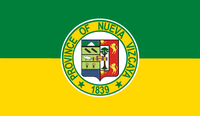 | Indoor flag: Horizontal bicolor with the provincial seal in the center; flag proportion is approximately 11:20. [68]
Outdoor flag: Plain field with the provincial seal in the center — green on obverse side, yellow on reverse; flag proportion is approximately 1:2. [68] | |
Region 4-B
(Mimaropa) | Occidental Mindoro | 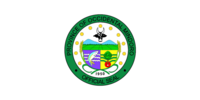 | Plain white field with the provincial seal in the center. Flag proportion is approximately 1:2. [69] | |
Region 4-B
(Mimaropa) | Oriental Mindoro | 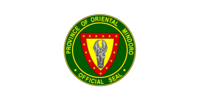
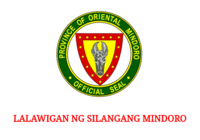 | Plain white field with the provincial seal in the center. Flag proportion of most visible variant is approximately 1:2. [70]
Sangguniang Panlalawigan chamber version: Plain white field, centered within which are the provincial seal and a line of text in red serif typeface ("LALAWIGAN NG SILANGANG MINDORO") below the seal; this flag's proportion approximately 7:10. [70] | |
Region 4-B
(Mimaropa) | Palawan |  | Plain golden yellow field with the provincial seal in the center. Flag proportion of most authoritative variant is approximately 1:2. [71] | |
Region 3
(Central Luzon) | Pampanga |  | Plain white field with the provincial seal in the center. Flag proportion of most authoritative variant is approximately 3:7. [72] | |
Region 1
(Ilocos Region) | Pangasinan |  | Plain golden yellow (officially termed “yellow santan”) field with the provincial seal in the center. Official flag dimensions are 36 inches in width and 56 inches in length, or a flag proportion of 9:14. [73] [74] | 20 February 2017 [73]
(SP Ordinance No. 206-2017) |
Region 4-A
(Calabarzon) | Quezon |  | Plain royal blue field with the provincial seal in the center. Flag proportion is approximately 4:7. [75] | |
Region 2
(Cagayan Valley) | Quirino |  | Plain orange field with the provincial seal in the center. Flag proportion of most authoritative variant is approximately 1:2. [76] | |
Region 4-A
(Calabarzon) | Rizal | 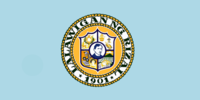 | Plain light blue field with the provincial seal in the center. Flag proportion of most authoritative variant is approximately 1:2. [77] | |
Region 4-B
(Mimaropa) | Romblon | 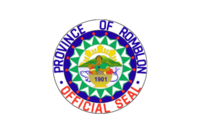 | Plain white field with the provincial seal in the center. Flag proportion is approximately 2:3. [78] | |
Region 8
(Eastern Visayas) | Samar | | Plain white field bordered golden yellow, with the provincial seal in the center. Flag proportion is approximately 3:5. [79] | |
Region 12
(Soccsksargen) | Sarangani | | Plain white field, centered within which are the provincial seal and a line of text in black sans serif typeface ("SARANGANI PROVINCE") above the seal. Flag proportion is approximately 3:5. [80] | |
Region 7
(Central Visayas) | Siquijor | 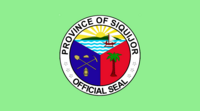 | Plain lime green field with the provincial seal in the center. Flag proportion is approximately 5:9. [81] | |
Region 6
(Western Visayas) | Sorsogon | | Plain dark green field with the provincial seal (itself almost enclosed by a golden laurel wreath) in the center. Flag proportion is approximately 1:2. [82] | |
Region 12
(Soccsksargen) | South Cotabato | 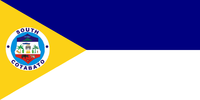
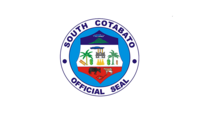 | Tricolor flag (both for government and civic use): Horizontal bicolor of navy blue (top) and white (bottom), with a golden yellow triangle spanning the width of the hoist (i.e., a chevron flag design), reminiscent of the Philippine flag’s basic design; centered within the chevron is the provincial seal. Flag proportion is approximately 1:2. [7]
Simple white flag (only for government use): Plain white field with the provincial seal in the center; flag proportion of most authoritative variant is approximately 4:7. [7] | |
Region 8
(Eastern Visayas) | Southern Leyte |  | Green field with thin white horizontal and vertical stripes meeting within the upper hoist quarter of the flag to form an offset cross; upon this cross is a wreath composed of an abaca (Manila hemp) leaf and a palm frond, while four "Star of Leyte" orchid flowers are set in a descending diagonal line from the cross intersection to the lower fly. Flag proportion of the most authoritative variant is approximately 13:25. [83] [84] | ca. 1970s [84] |
Region 12
(Soccsksargen) | Sultan Kudarat | 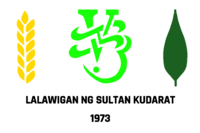 | White field with elements taken from the provincial seal: [85]
- a central stylized charge (colored in light green) that combines the alpha-syllabic glyphs “Su” and “Ku” of the pre-Hispanic Baybayin script; both glyphs share one kudlit indicating the vowel /u/.
- two elements flanking the central charge: a single upright panicle of rice (colored gold, and always on the left-hand side of the observer); and a single upright frond of African palm, (colored emerald green, and always on the right-hand side of the observer).
- two lines of text ("LALAWIGAN NG SULTAN KUDARAT" and "1973"), rendered in black and in a sans serif typeface, both the same font size.
Flag proportion of the most authoritative variant is approximately 2:3. [85] | |
| ARMM | Sulu | 

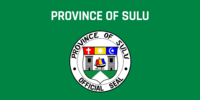 | Plain green field with the provincial seal in the center. Flag proportion of the most authoritative variant is approximately 1:2. [86]
The governor's flag contains the name of the governor written in white sans serif letters below the seal, while the variant flown outdoors by the provincial government contains "PROVINCE OF SULU" written in white sans serif letters above the seal. [86] | |
Region 13
(Caraga) | Surigao del Norte |  | Plain turquoise blue field with the provincial seal in the center. Flag proportion of the most authoritative variant is approximately 7:15. [87] | |
Region 13
(Caraga) | Surigao del Sur | 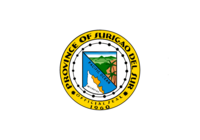 | Plain white field with the provincial seal in the center. Flag proportion of the most authoritative variant is approximately 7:10. [88] | |
Region 3
(Central Luzon) | Tarlac |  | Plain white field with the provincial seal in the center. Flag proportion is approximately 6:11. [89] | |
| ARMM | Tawi-Tawi |  | Plain golden yellow field, centered within which are elements of the modified provincial seal, plus lines of white text above ("PROVINCE OF") and below ("TAWI-TAWI"). Flag proportion of the most recent variant is approximately 5:7. [90] | |
Region 3
(Central Luzon) | Zambales |  | Plain white field with the provincial seal in the center. Flag proportion is approximately 1:2. [91] | |
Region 9
(Zamboanga Peninsula) | Zamboanga del Norte | 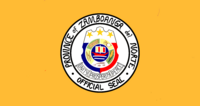 | Plain golden yellow field with the provincial seal in the center. Flag proportion of the most authoritative variant is approximately 9:17. [92] | |
Region 9
(Zamboanga Peninsula) | Zamboanga del Sur | 
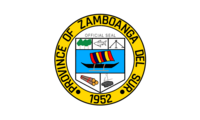 | Plain golden yellow field, centered within which are the provincial seal, plus a line of black text ("PROVINCIAL GOVERNMENT") in sans serif typeface. Flag proportion of the most authoritative variant is approximately 11:20. [93]
Sangguniang Panlalawigan chamber (white) version: Plain white field with the provincial seal in the center; this flag's proportion is approximately 3:5. [93] | |
Region 9
(Zamboanga Peninsula) | Zamboanga Sibugay | 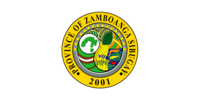 | Plain white field with the provincial seal in the center. Flag proportion is approximately 1:2. [94] | |



